At the 10th session of the 15th National Assembly, the Government and the National Assembly continued to concretize this spirit in the process of drafting the Law on amending and supplementing a number of articles of the Law on Education , institutionalizing a major policy, creating a favorable legal corridor for implementation. This is not only a management decision, but also comes from the aspirations of voters nationwide and the persistent voices of many National Assembly Deputies (NADs) throughout the past term.
The policy of building a unified set of textbooks has become an important highlight, affirming the consensus in planning and implementing policies for the quality of education and the rights of learners. The National Assembly has promoted its supreme supervisory role, as a forum for voters - where voices from the classroom and from each family are brought to the parliament and crystallized into a decision with the power of the people.
Therefore, the process of amending the Law on Education is not simply a legislative technique, but a manifestation of the common will of the whole society for the future of national education.
Persistently pursuing the policy of needing a set of state textbooks
Returning to the context of the years 2020 to present, when the policy of "one program - many textbooks" was implemented, practical shortcomings gradually revealed. Teachers had difficulty in choosing suitable books, parents worried about costs, while book resources were wasted and content was not synchronized, leading to many obstacles in testing and evaluating learning quality.
These shortcomings do not only stop at school gates or in families but are also widely reflected at voter meetings across the country. Voters' recommendations were then received by National Assembly deputies and turned into parliamentary issues, contributing to promoting discussions on the construction of a unified set of textbooks.
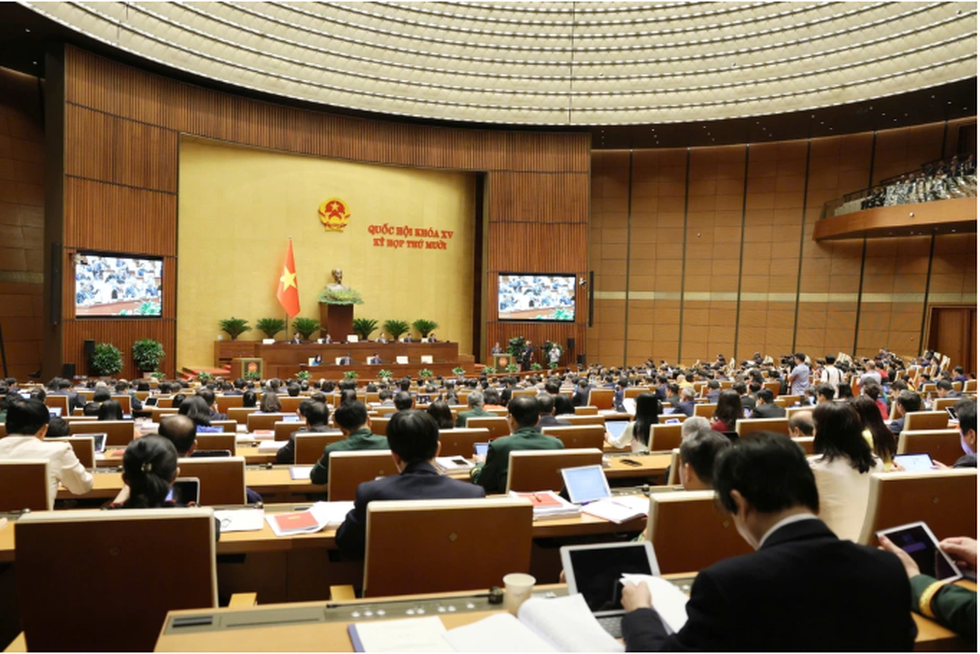
During many sessions of the National Assembly, education and textbooks were issues of concern to many delegates (Photo: Quochoi.vn).
During many sessions of the National Assembly, education and textbooks have become two of the most concerned keywords. Many question and answer sessions have become "hot" when National Assembly deputies, with the responsibility of representing the people, have frankly pointed out existing problems, emphasizing the urgent need for a synchronous solution regarding textbooks.
In August 2023, the National Assembly Standing Committee conducted thematic supervision on "Implementation of Resolution No. 88/2014/QH13 and Resolution No. 51/2017/QH14 of the National Assembly on innovation of general education programs and textbooks".
The monitoring results led to an important recommendation: The National Assembly considered and decided on the policy of assigning the Ministry of Education and Training to prepare the content of a set of State textbooks.
The parliament gradually "heated up" with opinions about a common set of textbooks, many opinions agreed, but there were also many concerns. The Minister of Education and Training at that time suggested "careful consideration" about assigning the Ministry to compile a unified set of textbooks.
Responding to this perspective, the National Assembly Standing Committee's Supervisory Delegation maintained the view that it is necessary to have a common set of State textbooks according to Resolution 88, to ensure consistency and fairness in general education.
In the parliament, Mr. Nguyen Dac Vinh, Chairman of the National Assembly's Committee on Culture and Society (when he was the Committee on Culture and Education), emphasized that Resolution 88 assigned the Ministry of Education and Training the task of compiling a set of textbooks for the new general education program, demonstrating the State's role in guiding knowledge.
Then, the National Assembly issued Resolution 122/2020/QH14 stipulating that if each specific subject has completed at least one set of textbooks that have been inspected and approved according to the Law on Education, the compilation of textbooks using the State budget will not be implemented. This solution is considered a temporary solution, aiming to maintain flexibility in the implementation of the new program without denying the spirit of Resolution 88.
Mr. Vinh said that the general education program is a legal program and only regulates the knowledge framework, while the general knowledge content will be shown in textbooks.
If the Ministry of Education and Training only plays the role of approving the content framework, it cannot ensure the responsibility of building and developing the general knowledge content of the State. Therefore, the Ministry needs to directly compile and develop the content of a common set of textbooks.


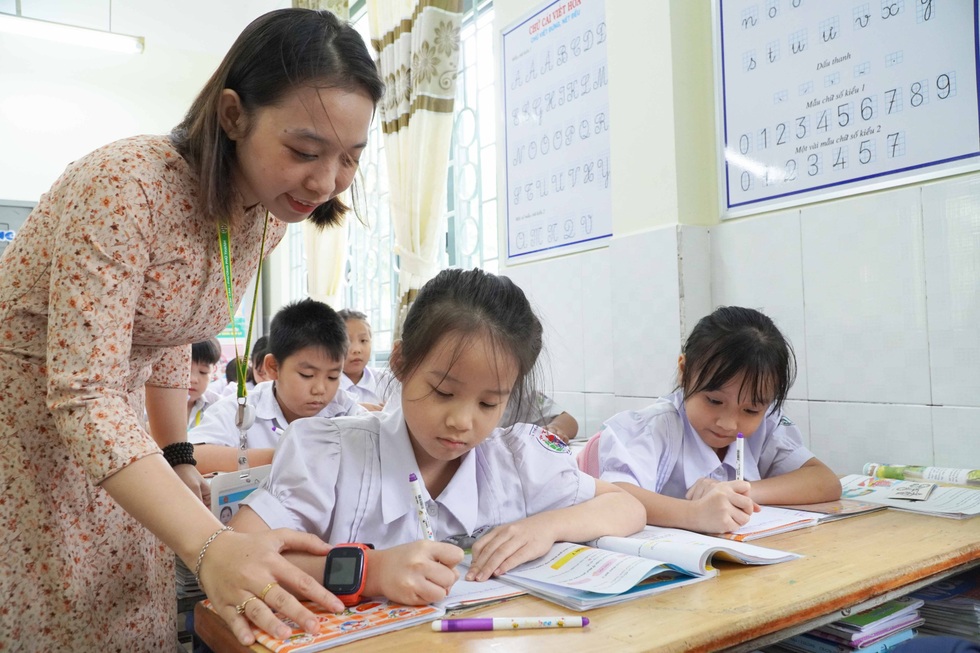
Resolution 88 assigned the Ministry of Education and Training the task of compiling a set of textbooks for the new general education program (Illustration: Huyen Nguyen).
The National Assembly leaders at that time emphasized that socializing textbook compilation was the right policy, but Resolution 88 must be understood in a unified way. Accordingly, textbooks are the core institutionalization of the general education program, fully reflecting the knowledge and values that the State wants to convey.
According to the leader, Resolution 122 of 2020 (9th session of the 14th National Assembly) of the National Assembly is only a "temporary solution" and does not deny Resolution 88 on assigning the Ministry of Education and Training to compile a set of State textbooks.
By early August 2025, before Resolution 71 was issued, the National Assembly Standing Committee gave its opinion on the draft Law amending and supplementing a number of articles of the Law on Education. Once again, the Committee requested the Ministry of Education and Training to study the direction of having a common set of textbooks, with other textbooks being reference materials.
Vice Chairman of the National Assembly Nguyen Khac Dinh also affirmed the need for a common set of textbooks for general education compiled by the Ministry of Education and Training. He reiterated: "This has been supervised and the Ministry has also promised, there is a resolution to supervise. It is currently being implemented, so it should continue to be implemented urgently... I think it is necessary to try to implement it because the aspirations and psychology of the whole people are very appropriate."
Institutionalization by consensus
At the 10th session of the 15th National Assembly, many National Assembly deputies said that a unified set of textbooks "is in line with the Party's will and the people's wishes".
According to Duong Khac Mai, Deputy Head of the National Assembly Delegation of Lam Dong Province, through contact with voters, many parents expressed that a unified set of textbooks is a correct policy, in line with the Party's will and the people's wishes, not only ensuring equal access for students but also facilitating the management and unification of state agencies in education, school administration and synchronization for parents, reducing the complexity when students transfer schools.
Sharing the same view, National Assembly Deputy Thai Van Thanh (Nghe An Delegation) commented that applying a unified set of textbooks nationwide not only ensures equal access for students but also facilitates the management of state agencies in education and school administration.

Many opinions agree that there should be a unified set of textbooks nationwide (Photo: Huyen Nguyen).
National Assembly Deputy Nguyen Thi Thuy (Thai Nguyen Delegation) analyzed that 2025 is the year when the whole country joins forces and focuses on important and historic tasks and has achieved very proud achievements. In particular, the "beneficiary" policy, especially in education, is increasingly better guaranteed, reflecting the State's commitment to the rights of learners.
Ms. Thuy stated: Resolution 71-NQ/TW on educational development breakthroughs has clearly established the viewpoint that “education is the top national policy”. Accordingly, exempting tuition fees and textbooks from 2030 is not only financial support but also an investment in the future of the nation, affirming the strong commitment of the Party and State in building a fair society, where all children have the opportunity to develop comprehensively.
According to Ms. Nguyen Thi Thuy, this policy has been warmly welcomed by the people, showing high consensus. She also suggested building a set of textbooks that can be reused for many years to avoid waste. Free textbooks need to go hand in hand with the spirit of saving, from the compilation stage to the process of using the books later.
Supporting the State in providing a set of textbooks for nationwide use, delegate Ma Thi Thuy (Tuyen Quang Delegation) proposed having regulations to ensure independence and transparency in the appraisal process to avoid the situation of both managing and evaluating.
National Assembly Deputy Pham Van Hoa agreed that the use of a unified set of textbooks chaired by the Ministry of Education and Training is necessary and appropriate. However, to avoid negative situations, the construction of a unified set of books nationwide needs to be carefully evaluated by a council and leading experts. The compiled programs need to inherit and promote appropriately from the old sets of books.
The unification of a set of textbooks, along with the policy of free tuition and free textbooks from 2030, is not only financial support but also a strategic investment for social equity. This is the clearest evidence for the principle of “education is the top national policy” and shows that all major decisions need to come from practice, ensuring that the Party’s will is in line with the people’s will.
Source: https://dantri.com.vn/giao-duc/sua-luat-giao-duc-the-che-hoa-chu-truong-mot-bo-sgk-thong-nhat-toan-quoc-20251110230446647.htm




![[Photo] Prime Minister Pham Minh Chinh attends the Patriotic Emulation Congress of the Ministry of Foreign Affairs for the 2025-2030 period](https://vphoto.vietnam.vn/thumb/1200x675/vietnam/resource/IMAGE/2025/11/10/1762762603245_dsc-1428-jpg.webp)


![[Photo] Prime Minister Pham Minh Chinh attends the annual Vietnam Business Forum](https://vphoto.vietnam.vn/thumb/1200x675/vietnam/resource/IMAGE/2025/11/10/1762780307172_dsc-1710-jpg.webp)





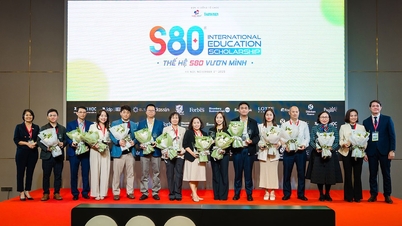


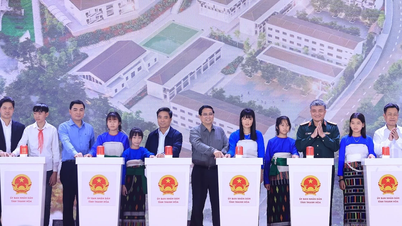

















































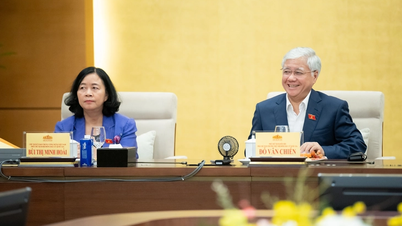




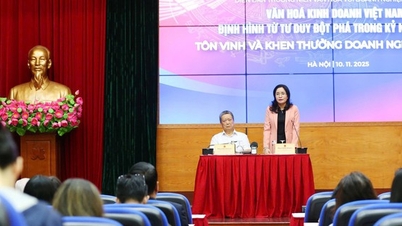










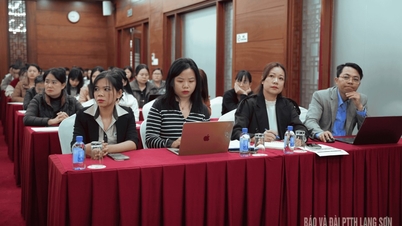


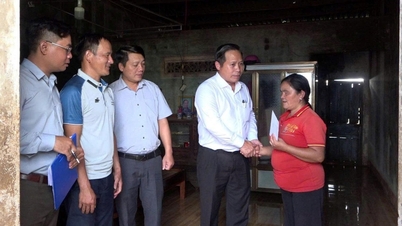


![Dong Nai OCOP transition: [Article 3] Linking tourism with OCOP product consumption](https://vphoto.vietnam.vn/thumb/402x226/vietnam/resource/IMAGE/2025/11/10/1762739199309_1324-2740-7_n-162543_981.jpeg)











Comment (0)